Female labor activist sentenced to death in Iran
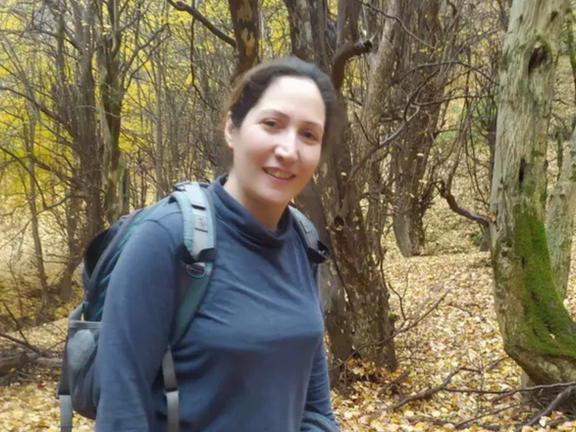
Sharifeh Mohammadi, a prominent labor activist imprisoned in Iran has been sentenced to death on charges of armed rebellion.

Sharifeh Mohammadi, a prominent labor activist imprisoned in Iran has been sentenced to death on charges of armed rebellion.
The Campaign to Defend Mohammadi wrote on Instagram, "This sentence is based on the pretext of Ms. Mohammadi's membership in an independent, public, and legal labor organization a decade ago, demonstrating the baselessness of the verdict."
The campaign’s statement called the ruling "absurd and unfounded," intended to instil fear among activists as the government continues to oppress any voices of dissent.
Mohammadi, who was arrested in December, is one of the latest in a wave of executions in a bid to quash dissent. Last year, 834 Iranians were executed, according to the United Nations. It was a record high, 50 percent higher than the previous year.
At least 22 of those were women, Iran the world's number one executioner of women. The 2023 figures were the highest since 2014 according to Iran Human Rights.
The campaign called for Mohammadi's acquittal and unconditional release, declaring, "This sentence is not only against Sharifeh but is a declaration of war and a death sentence against all social and civil activists."
In January, the UN called for an end to the "horrific wave of executions" underway, with 67 executions in May alone.
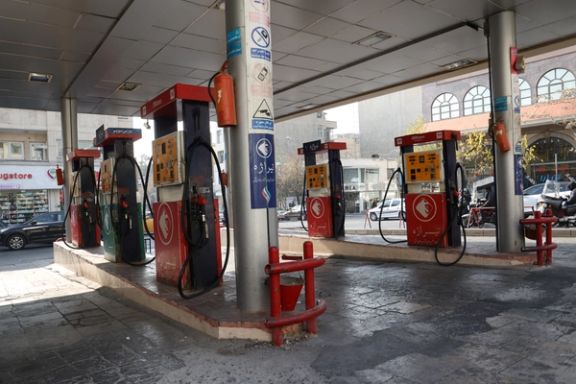
Iran has found itself importing gasoline since last year due to the government's inability to expand oil refineries and exacerbated by the delivering of approximately one million new, low-efficiency domestic cars into the market.
Gholamreza Dehghan Naserabadi, a member of parliament, in a statement made in June, highlighted Iran's deepening energy imbalance and projected a $2 billion gasoline import requirement for the current year. He also noted the necessity for diesel imports.
Iran's gasoil deficit was 1.5 million liters per day in 2023.
Iranian officials have indicated that the country engages in barter agreements, exchanging its dirty fuel, mazut, for foreign gasoline and gasoil.
According to Kpler, Iran exported between 230,000 to 240,000 barrels per day of mazut in 2023, slightly more than in 2022. However, the exact portion of this volume that was exchanged through barter for gasoline and gasoil has not been specified.
According to an official report from Iran's Oil Ministry, reviewed by Iran International, Iran's gasoline deficit escalated sharply in 2023. Consumption grew by 11.5%, yet refining capacity expanded by only 1.7%. Iranian refineries produced a base gasoline output of 97.5 million liters per day (ml/d) in 2023, while consumption surged to 115.5 ml/d.
To mitigate the deficit, Iran increased gasoline supply by adding 14 million liters per day through chemicals, aromatics, and MTBE (Methyl-tertiary-butyl ether), a gasoline additive known to be carcinogenic in certain animals. Despite these measures, the remaining shortfall was filled by gasoline imports or withdrawals from existing storage reserves.
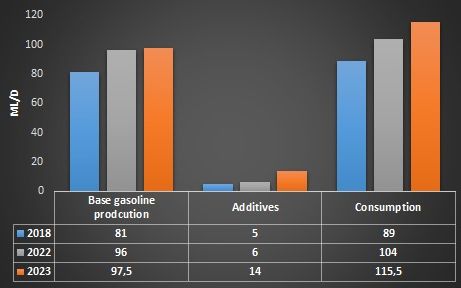
The volume of additives in Iran's base gasoline has surged from 5 ml/d in 2018 to 14 ml/d in 2023, marking a staggering 180% increase. In contrast, base gasoline production grew by only 20% during the same period. This rapid growth in non-standard additives has led to significant health and environmental concerns, as Iran's produced gasoline has become increasingly unhealthy and pollutant-laden in its efforts to compensate for fuel deficits.
While the official document does not specify the exact volume of fuel imports, some officials have confirmed that Iran imported $2 billion worth of gasoline during the last Iranian fiscal year, which ended on March 20.
According to the Oil Ministry's report, strategic gasoline reserves stood at 1.17 billion liters by the end of 2023, unchanged from the previous year but down 13% from 2018 levels.
Furthermore, the report acknowledges that only a quarter of the gasoline produced in Iranian refineries meets Euro 4 or Euro 5 standards. Out of Iran's nine crude oil refineries, only three have been built since 1979 - when Islamic Republic came to power- collectively capable of refining less than 690,000 barrels per day, which accounts for 32% of the total refining capacity. The bulk of the refining capacity was built originally with Western licenses and technology. These refineries have since relied on domestic or Chinese technologies for upgrades, with the most recent refinery, Persian Star, commencing operations in 2017.
A major reason for the rise in consumption is domestic auto manufacturing which relies on older engine technologies. Despite producing approximately one million vehicles annually, each with high fuel consumption rates, nearly all are sold domestically. However, Iran's refining capacity growth has lagged the increasing demand.
Another major reason for ever-growing consumption is the low price of gasoline. Presently, Iran maintains the world's cheapest gasoline prices. One gallon costs consumers less than 10 US cents.
In late 2019, the government attempted to address economic challenges by raising gasoline prices by 50-200%, leading to widespread and violent protests. Since then, the Islamic Republic has refrained from adjusting fuel prices, despite a 15-fold fall in the value of the Iranian rial against the dollar since 2019.
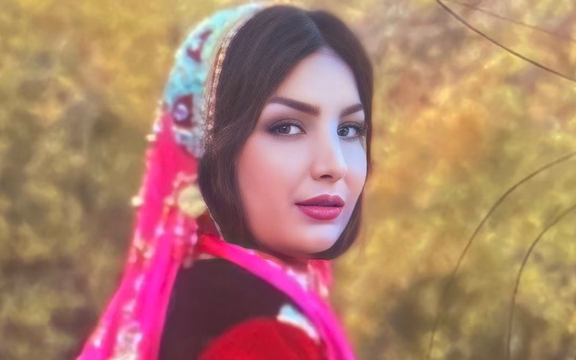
The sister of an Iranian protester on death row, Mojahed Kourkour, was arrested after security forces raided the family home.
His sister, Negar Kourkour, said "there is no information available about the detaining authority or the location" where Rana has been taken.
This latest raid is not an isolated incident. The Kourkour family home has been targeted by security forces before.
Mojahed Kourkour was arrested following an incident in November 2022, when shots were fired on protesters in the southwestern city of Izeh, resulting in the deaths of several residents, including nine-year-old Kian Pirfalak.
In April 2023, Iran's judiciary sentenced him to death on charges of "enmity against God" (moharebeh), "corruption on earth," and "armed rebellion against the state."
He was denied access to his chosen lawyer, and his coerced "confessions" were broadcast by state media shortly after his arrest in December 2022.
The Iranian authorities have labeled the Izeh incident a "terrorist" act, blaming opposition groups. However, Kian Pirfalak's mother contested these claims at her son's funeral, stating that government forces had fired at their family car.
Amnesty International has called on Iran's judiciary to halt Kourkour's execution and overturn his death sentence, which comes amid record numbers of state-sanctioned executions.
The organization also urged the regime to provide him with immediate access to his family, an independently chosen lawyer, and adequate medical care.
Furthermore, Amnesty International has pressed for independent observers to be allowed access to capital trials related to the protests and called for a moratorium on executions with the ultimate aim of abolishing the death penalty in Iran.
Last year, over 850 Iranians were executed in the highest numbers in years.
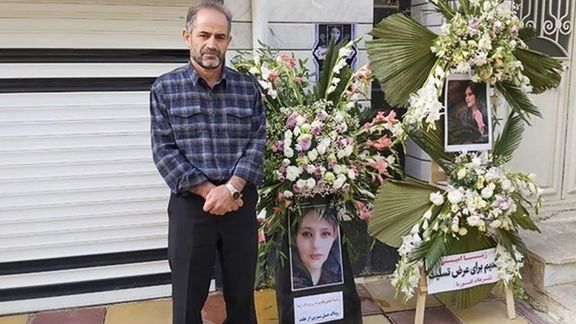
The father of Mahsa Amini, whose death in Iran's morality police custody sparked a nationwide uprising, stated his family is boycotting the sham presidential elections.
“We are not endorsing any specific candidate in this election, and we have little hope for the realization of justice in the future," Amjad Amini wrote on Instagram.
Since Mahsa’s death in September 2022, her family has been under considerable pressure from the government, including being faced with travel bans. Her father has faced multiple summons to the Intelligence Office in Saqqez since her death.
Mahsa’s uncle has also been detained by security forces, and threats have been levied against Mahsa's brother.
In December, the family's lawyer, Saleh Nikbakht, was sentenced to prison, charged with "engaging in propaganda against the Iranian regime."
The national and global outrage over Mahsa's death is one of the most significant challenges to Iran's clerical establishment since the Islamic Republic was established in 1979.
In March, a UN fact-finding mission declared that Tehran's crackdown on the 2022 protests—including killings, imprisonment, torture, and sexual violence—constitutes crimes against humanity.
The Fact-Finding Mission was established by the UN Human Rights Council in November 2022, two months after the Woman, Life, Freedom protests erupted across the country in response to the death of 22-year-old Iranian-Kurd, Mahsa.
The team concluded that Iran is responsible for "physical violence" leading to Amini's death. The Iranian authorities have denied responsibility, attributing her death to a childhood medical condition following surgery.
However, the UN report dismissed this explanation, confirming "evidence of trauma to Ms Amini's body, inflicted while in the custody of the morality police."
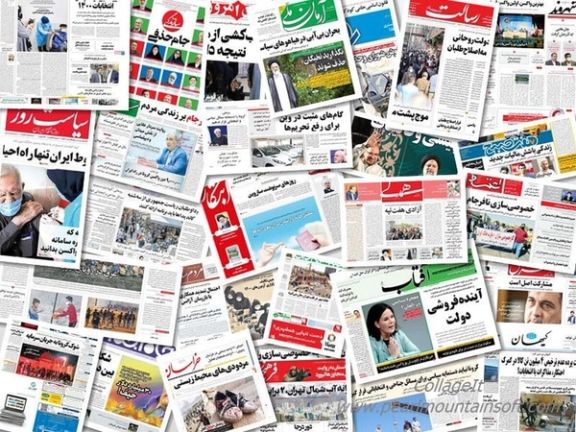
As Iran’s presidential election runoffs approached this week, the government intensified its media crackdown to control the narrative amid historically low voter turnout in the first round on June 28.
Tehran Prosecutor's Office issued a "warning" to the management of the Tehran-based economic newspaper Jahane Sanat over "publishing an article about the election results," according to a report by Iran’s judiciary news agency, Mizan, on Tuesday.
"The judicial case of this newspaper will be investigated in this regard," added Mizan.
In April, a case was opened against Jahane Sanat for “compromising national security" for coverage of Iran’s April 13 missiles and drone attack against Israel.
Earlier in June, Iran's Press Supervision Board issued strict guidelines for media coverage of the upcoming election emphasizing that disseminating material that promotes "the boycott of elections and lower participation" and "organizing unauthorized protests, strikes, or sit-ins" constitutes a crime. These guidelines also prohibit media from publishing the results of opinion polls.
According to non-profit rights group Defense of the Free Flow of Information (DeFFI), 17 newspapers in total have received warnings. DeFFI noted that the judiciary is attempting to mitigate the negative public perception associated with terms like "declaring a crime" and "filing a judicial case." To this end, the judiciary is increasingly using less charged terms like "warning" without actually altering the level of repression or the underlying legal processes. This approach follows extensive extralegal actions against media and journalists, aiming to soften the language while maintaining strict control over the press.
Additionally, the Iranian Ministry of Interior denied press credentials to four journalists from Shargh Newspaper hours after voting began in the presidential election, effectively barring them from covering the process. Officials abruptly canceled credentials for ‘reformist’ newspapers Shargh and Hammihan reporters, according to IranWire.
Last week, Iran’s security and intelligence forces sealed the studio of the liberal-leaning Fardaye Eghtesad (Economy's Future) media outlet.
DeFFI further noted that in June 2024, security and judicial incidents against Iranian media increased ninefold to 27 in comparison to the previous month. This marked the highest level of media suppression in a single month since the beginning of 2024.
The Islamic Republic has restricted press freedom since the early 1980s. Hundreds of journalists have been arrested over the years and some have spent long years in detention.
Meanwhile, most government-controlled media associated with the regime's 'reformist' and hardliner factions continued urging people to vote in the second round on Friday. They all prominently highlighted Supreme Leader Ali Khamenei's call on Wednesday to make up for the low turnout last week.
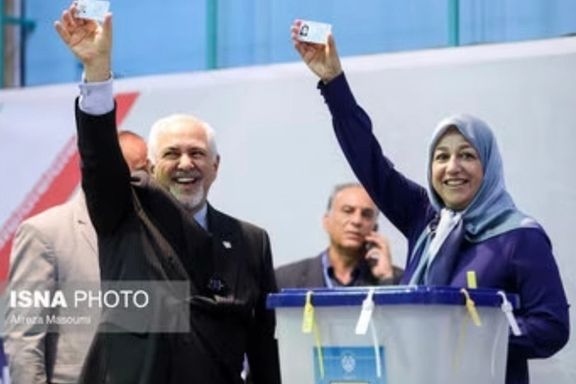
As the runoff race of the presidential election in Iran approaches, the government and its media are trying to create the illusion of a contested political atmosphere, to attract disillusioned voters.
With over 60% of the electorate abstaining in the first round on June 28th, the Islamic Republic faces a crisis of legitimacy. The boycott and abstention by a sizeable majority has highlighted public disillusionment with both 'revolutionary' and 'reformist' factions, which many Iranians view as two sides of the same coin. The two handpicked candidates have engaged in a series of provocative statements and what many observers call "theatrical infighting" to reignite public interest.
Supreme Leader Ali Khamenei, in his speech on Wednesday, tried to downplay the significance of the low turnout. He suggested that the lack of participation was not an indication of opposition to the Islamic Republic, but rather a sign that people were preoccupied with their personal lives. Yet, this attempt to save face seems to have done little to mask the regime's growing insecurity. Khamenei's directives to both political factions—who, as critics point out, cannot make a move without his approval—are clear: they must rally the disillusioned masses back to the ballot box to restore the government's “dignity."
Adding to the electoral maneuvering, Ali Akbar Salehi, former Foreign Minister and ex-head of the Atomic Energy Organization, entered the fray with comments about Saeed Jalili, the hardline presidential candidate. Responding to allegations that Jalili obstructed the revival of the JCPOA (Joint Comprehensive Plan of Action) during President Ebrahim Raisi's administration, Salehi revealed that “the agreement was nearly finalized and that former Foreign Minister Hossein Amir-Abdollahian was poised to sign it.”
The revelation was an implicit nudge to the electorate: a vote for Masoud Pezeshkian might revive the nuclear deal, although the real obstacle, as everyone knows, is Khamenei himself.
Salehi didn't stop there. He disclosed that the Supreme National Security Council had proposed an additional demand in the last moment that derailed the agreement. Jalili, as leader’s man in the council, he claimed, misrepresented Khamenei’s stance on secret negotiations with the United States. The narrative paints Jalili not just as an obstructionist but as someone who viewed possible diplomatic successes by others as personal competition rather than national imperatives.
The tensions within the government's ranks were further highlighted by Mohammad Javad Zarif, the former foreign minister who has been campaigning for Pezeshkian.
In an Instagram live session, Zarif criticized Jalili, questioning the origins of his "falsehoods" and suggesting they might “come from Israel.” Zarif, who was once criticized for glossing over government policies during Hassan Rouhani’s presidency, is now trying to get more people to vote, accusing Jalili of dishonesty and being responsible for brining on sanctions.
Zarif's plea to the public to reject Jalili on Friday might seem like a genuine call to action. However, many remain skeptical, seeing Zarif's efforts as yet another maneuver orchestrated to lure voters back to the polls. The fear voiced on social media is that, regardless of the election's outcome, the cycle of betrayal will continue—citizens' demands and freedoms will be forgotten, much like during the terms of presidents Rouhani and Mohammad Khatami.
As the second round of voting looms, the government's attempts to stage-manage the election underscore its vulnerability. The Iranian public, increasingly aware of the manipulations, faces a stark choice: participate in what many see as a sham process or continue to express their discontent through abstention. One thing is clear—the facade of electoral democracy in Iran is wearing thin, exposing the government's struggle to maintain its grip on power.